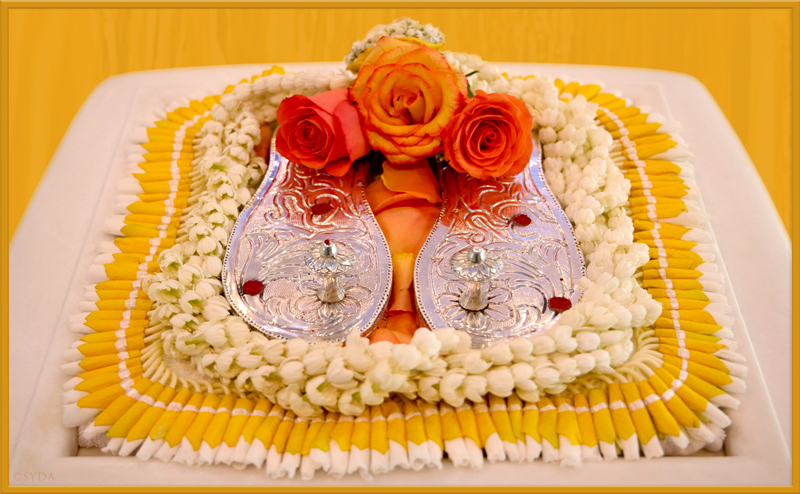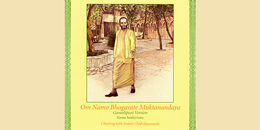At a time when I was feeling completely lost and alone, I heard the hymn Gurudeva Hamara Pyara. As I listened, something shifted inside me. It felt like all my problems were already solved. I realized I wasn’t alone, for my Guru is always with me. After that, I kept listening to the hymn. It gave me peace, strength, and a deep sense that I am being guided. I am deeply grateful.
Pune, India
When singing Gurudeva Hamara Pyara, I experience a sense of great energy and love emanating from within. It is as though the hymn carries me along in a powerful stream of energy and resounding sound that connects me with the whole universe. I can clearly experience the strong connection with my beloved Guru expanding as I sing every verse of this hymn.
The celebration of Gurupurnima this month has strengthened my awareness that the Guru dwells within me as my own Self, guiding and protecting me.
I have also been able to perceive the constant and great blessings flowing into my life from my beloved Guru’s grace. Her grace bestows tremendous gifts that have a profound and concrete expression in every aspect of my life. I am thankful for my Guru´s blessings, which are continuously supporting me and leading me to experience the power of the Guru-disciple relationship.
Mexico City, Mexico
Gurudeva Hamara Pyara is a chant that I sing every night before I go to sleep. The joy of chanting with the music ensemble of Gurudev Siddha Peeth blankets me in peace and love.
I feel so blessed to be able to bring this reminder of the Guru’s love into my room as I prepare to end my day. For me, it is a divine practice of limitless joy.
California, United States
Gurudeva Hamara Pyara has been a constant source of support all year, holding me and my children like a warm hug. It has been a comforting reminder of God’s love and the Guru’s grace, especially as we chant it together before bed.
Mumbai, India
I have loved singing
Gurudeva Hamara Pyara for the last two decades. I love its melody and words. Reading the meaning of each verse strengthens my belief that through the Guru’s grace and love, I can become free from fear and from all worldly things. Through the Guru’s grace, I can connect to my own Self and overcome my fear of birth and death. I bow down to the lotus feet of my Shri Guru with complete surrender in my heart.
Pune, India
At the end of every month, I make a point to sing
Gurudeva Hamara Pyara and admire the beauty of the Guru’s adorned sandals. Being in contact with this wonderful image allows me to make peace with the world. Every time I sing this hymn, I experience a different kind of joy and renewed gratitude, as if it were the first time. This is happiness, I tell myself!
San Giorgio a Cremano, Italy
This is such a powerful hymn. It reassures and enriches my mind and spirit and fills my heart with gratitude. I realize how fortunate I am to walk this path. Whenever I listen to or sing this hymn, I feel energy surging, and my entire being feels refreshed and energized. This hymn reminds me that no matter where I am, Gurumayi is guiding and protecting me, helping me realize my own divinity.
Cuttack, India
Every day when I sing
Gurudeva Hamara Pyara, I experience that each word of this hymn is like an embodiment of Gurumayi for me. I am fortunate that I am blessed by Gurumayi’s grace, which guides me throughout my life. Remembering Gurumayi’s presence in my heart gives me immense joy. I am able to perform all my duties and responsibilities due to the understanding that Gurumayi is with me in my heart. Shri Guru is the very foundation of my life.
Lucknow, India
Singing
Gurudeva Hamara Pyara makes me feel so happy! Its melody is so uplifting, and its message is so simple and perfect: the Guru is our life’s support.
It’s so true.
California, United States
I regularly sing this hymn after my morning practice of meditation. Doing so enables me to move forward with my day and focus on my daily activities knowing that I have the support and guidance of the Guru’s grace. Usually, when I conclude this daily practice, I feel energized and able to approach even the most challenging of tasks with a sense of clarity. Now that I am retired, I have more time to dedicate to my transformative spiritual journey and my goal of experiencing true love and joy in my life.
New Amsterdam, Guyana
I love being able to sing
Gurudeva Hamara Pyara on the last day of each month. It gives me a sense of completeness, peace, and contentment. I experience a deep silence within, which encloses a feeling of intense gratitude. To me, this deep silence is like the sweet part of a juicy nectarine that surrounds a strong and supporting seed, or core, of gratitude for the Guru’s grace in my life.
Farnborough, United Kingdom
As one of the first chants I learned at Shree Muktananda Ashram over thirty years ago, Gurudeva Hamara Pyara holds a deep and dear place in my heart’s memory. And as I savored the beautiful balance of voices and musicians in this recording, I felt the warmth spread throughout my whole body—just as it has every time I have chanted this divine hymn.
After it ended, I was in a state of reverie, interrupted only by the thought that if I had to choose just one hymn to embody the essence of the Siddha Yoga teachings, this would be the one I would choose.
California, United States
I sing this amazing hymn each day at the conclusion of my morning meditation and prayers. It gives me guidance and blessings each day.
Today I read the translation of each verse, and tears welled up in my eyes; I experienced the bliss of the Siddhas, who have awakened the divine energy within and are the support of my life.
I am grateful beyond words to our beloved Gurus for their compassion and love for humanity.
Florida, United States
After chanting Gurudeva Hamara Pyara this morning, I sat absorbing its sweet resonance. I had the awareness that all the material details of my life are taken care of, that my life is assured, and that my part is to turn my attention to the daily interactions I have with others to make sure they are kind and loving—and, when I am alone, to honor myself.
Thornbury, Australia
Gurudeva Hamara Pyara was one of the first chants I learned on the Siddha Yoga path, and it has always inspired me with a great sense of strength, support, devotion, and joy.
Today as I sang this hymn, I felt carried by a flow of grace that protects me from pitfalls and fear. I truly felt the sacredness of the words, as if every word was dancing on the tip of my tongue and in my heart. I experienced once again the great power of the Siddha Yoga practices, which allow us to experience the Truth.
Macerata, Italy
As soon as I opened the Siddha Yoga path website, I was astonished by the beauty of Shri Gurudev’s sandals and by the delicacy and strength of the color of roses laid on the sandals and on the pillow. What a splendor!
When I started singing
Gurudeva Hamara Pyara while continuing to admire the image, I felt all the support, love, and joy contained in this hymn. A great bliss and sense of protection invigorated my heart.
San Giorgio a Cremano, Italy
Listening to this hymn, I could feel my beloved Guru’s love pulsating in my heart. By illuminating my day, the hymn keeps on resonating in my whole being.
Mersin, Turkey
As I was singing the hymn
Gurudeva Hamara Pyara, I could feel the rhythm and sound of the
shakti coursing through everything. My mood changed. I am ever grateful for this subtle awareness.
Texas, United States
Whenever I sing the hymn
Gurudeva Hamara Pyara, I also read the translation of the text. It is important for me to make the effort to understand and feel what I am singing.
Today, as I did this, these words from verse 3 touched me very much:
“Whoever seeks refuge in Nityananda obtains the light of knowledge.”
When I face difficulties in my life, I often sit down and call out inwardly to Bade Baba. I tell him about my challenges.
I experience that Bade Baba is always there for me, bringing a sense of relief and the right understanding to overcome my difficulties.
Unterlangenegg, Switzerland
This hymn fills me with gratitude. Whenever I listen to or sing it, I always feel empowered. Singing
Gurudeva Hamara Pyara refreshes my confidence and reinforces my experience of my Guru’s presence within me.
I am so grateful for the Guru’s benign presence, which supports me in my efforts to think beneficial thoughts, act in right ways, and consistently offer the best of myself. This hymn reassures me, over and again, about how fortunate I am to be a disciple of my Guru.
Cuttack, India
Many years ago when we lived in a small town, my husband and I used to attend weekly
satsang at our local chanting and meditation group. The small group was so full of good cheer and deep devotion that it was a joy to attend. The finale of the evening was all of us standing together and in unison singing
Gurudeva Hamara Pyara with great love for our Guru, our path, and each other.
Now I treasure the tradition of singing this hymn at the end of each month on the Siddha Yoga website; the photos of the Guru’s
padukas are always so enchanting!
Oregon, United States
This has been my favorite hymn since childhood. Each time I sang this at the end of a
satsang, a wave of gratitude would surge in my heart. I would feel thankful for being on this divine path and on this sacred journey.
Still to this day, whenever I sing or hear
Gurudeva Hamara Pyara, my heart feels full of love and gratitude.
Gurudev Siddha Peeth, India
What a beautiful start to this morning! Each morning I wake up and look at the Siddha Yoga path website, and when I saw this beloved hymn, I couldn’t resist singing it! It brings back such fond memories of my childhood, singing to the Guru after evening
satsangs.
Pennsylvania, United States
This sweet hymn always reminds me of Gurumayi, Baba Muktananda, and Bade Baba. I feel a little sparkle in my heart and I know it’s the Guru’s love. For me it’s a gentle reminder to meditate on my Self.
New York, United States
This prayer is so powerful that whenever I sing it, all my confusion melts away and my heart gets filled with blissful energy, courage, and an ecstatic deep love for my Guru. I feel so connected to my heart that I stay still and calm for quite an extended period of time.
My relationship with my Guru gets stronger every time I sing this prayer.
Cuttack, India
It was delightful to sing these verses. Though it has been a long time since I last heard this beautiful hymn, the melody and the lyrics came to me easily from within.
This sweet music on the Siddha Yoga path website, along with so many other examples, both invokes and expresses my deep appreciation for this path and for the Siddha Yoga Gurus.
Oregon, United States
As my husband and I sang
Gurudeva Hamara Pyara on the last day of the month, my heart was filled with love and gratitude for the guidance Gurumayi has provided us throughout the month. I was especially thankful for the various chants and hymns to Shiva, as well as the stories about Mahashivaratri and devotion on the Siddha Yoga path website.
The Siddha Yoga practices are truly my way to connect to the Guru’s
shakti. They
are my life’s support!
New York, United States
This hymn is sung with such smoothness, purity, and serenity. Listening to it puts me in a pure, serene state of oneness.
Georgia, United States
A deep yearning to be with the Guru rose in my heart, and I knew to go to the Siddha Yoga path website. Swirls of love danced in my whole being when I saw the Guru’s
padukas and heard my favorite hymn,
Gurudeva Hamara Pyara. I sang it along with the recording. The wish of my heart was granted.
Nora, Sweden
The image of the Guru’s
padukas is a wonderful meditation in itself! And the sounds and meaning of this hymn are inexpressibly sweet. About a week ago, as I woke up from a dream, I was singing, "
hai jivana ko adhara" over and over to myself. It was so sweet to remember which hymn the words are from. And I was reminded, deep in my heart, that the Guru
is my life’s support.
Oregon, United States
I remember the weekly and monthly
satsangs in my childhood and teenage years. We used to sing this
bhajan at the conclusion of each
satsang, experiencing the meaning of every line as we sang it. As a result, we would bring home with us a different joy and energy after
satsang.
So this
bhajan has always been a favorite of mine. And singing the last verse instantly gives me a lighthearted feeling and fresh energy to move forward in life.
Dombivli, India
This hymn has always brought me happiness. As I sing of my love for my Guru, I fill with joy. I love the way
Gurudeva Hamara Pyara gives me a natural way to express my devotion as I walk this path, so abundant with grace and the blessings showered upon me this year.
Looking forward to the year ahead, I know I am guided by Gurumayi’s shining light; I feel steadfast and secure.
Hampton Hill, United Kingdom
For me, it has been a wonderful year of exploring the ever-abiding presence of the Guru’s grace in my life that this hymn celebrates. My beautiful mother passed away this summer, and I found the Siddha Yoga teachings upheld me in my daily life as I cared for her before her passing.
Since that time, whenever I sit for meditation, I have a brief vision of Gurumayi’s flowing robes beside me and I feel reassured that my path is lit by her love and grace. The Guru truly is my “life’s support.”
Wisconsin, United States
I have been singing and listening to this beautiful hymn ever since my childhood. I love it so much. This year I feel I have gained a deeper understanding of the refrain "
hai jivana ko adhara"—the Guru is “our life’s support.”
I have experienced more than ever that Shri Guru is the base, the foundation of my life. I am so grateful for Gurumayi’s abundant grace and protection.
Bangalore, India
I love this timeless hymn—timeless in the sense that I feel I can sing it at any time. I can feel the devotion it embodies. I find within it the virtues of love, surrender, trust, and gratitude. And it reveals to me both the value and the experience of one-pointed faith in Shri Guru.
Thane, India
When I saw the
padukas accompanying
Gurudeva Hamara Pyara marking the culmination of December 2020, I felt I could see a stream of Gurumayi’s blessings running through the entire year. I remembered the many beautiful
satsangs made available on the Siddha Yoga path website throughout this difficult time. Participating in these events inspired me to deepen my Siddha Yoga practices and created a haven of grace for my life.
As a result, I feel that I have been in a golden bubble of protection, peace, and love during this past year.
New Mexico, United States
Each night during my time in Gurudev Siddha Peeth, after a glorious day of following the daily schedule, I sang
Gurudeva Hamara Pyara in the courtyard as a way of saying good night to Bhagavan Nityananda. We sang as we faced his tall, dark
murti.
It was a small gathering, and I felt very close to Bade Baba. It was a very lovely way of closing the day and getting ready for the fragrant and peaceful night.
I feel I am in Gurudev Siddha Peeth every time I listen to this beautiful hymn.
Colima, Mexico
Sitting at my altar and singing
Gurudeva Hamara Pyara with the recording, I feel such a strong connection to Gurumayi! I feel her love, which fills the universe.
Capital Federal, Argentina
Every time we would chant
Gurudeva Hamara Pyara at the conclusion of each
satsang at the local Siddha Yoga meditation center, it brought about tremendous joy and gratitude in me, having just spent that precious time being in the
satsang filled with the Guru’s teachings, grace, and love. I felt that this
bhajan was so apt in allowing me to express my inner feelings as I would bow down before the Guru’s chair during
darshan.
Nairobi, Kenya
What joy to have celebrated Baba’s birthday month, immersed in the powerful teachings given in the audio
satsang! And how wonderful it is to sing
Gurudeva Hamara Pyara now, at the culmination of “Baba’s month!” I bow down in gratitude for being showered with so much love. Baba is my pillar of strength and light, always protecting and guiding me.
Nairobi, Kenya
For many years
Gurudeva Hamara Pyara has concluded every
satsang at the local Siddha Yoga chanting and meditation group that I attend. In hearing and singing it, I have felt the support of the Siddha Yoga Gurus.
Each time, during and after singing it, I feel immersed in the Guru’s protection and love and that the purpose of my life is assured. I feel great confidence that I will reach my goal, and my Guru’s goal for me, which is to realize the Truth of my being.
My heart is full of gratitude to my Gurus for this great gift.
London, United Kingdom
I’ve loved this
bhajan from the first time I heard it. I sing it with heartfelt love, devotion, and gratitude for our Guru, offering the syllables to Gurumayi and to the lineage of Siddhas.
Since the recent live stream
satsang, something amazing has happened. When I sing, the syllables seem to be one with me. They arise from pure joy, with pure love, and my awareness expands, dancing with the cosmos. Then the syllables subside back into joy and love.
Geelong, Australia
What a beautiful composition! It has touched my soul and brings happy tears to my eyes out of gratitude and love for my Guru.
I always thank Baba ji many times when I sing the last paragraph, since he gave us the Siddha Yoga path to follow. Now, with the support of the Siddha Yoga teachings, I am living a sacred life.
Pune, India
The sound of this
bhajan takes me back to a Siddha Yoga retreat with Gurumayi in Cuernavaca, Mexico, the city of eternal spring. I remember chanting this
bhajan in a cozy, warm, white tent filled with spring flowers. And I remember experiencing overflowing gratitude—for all that I had received during the retreat, and for being surrounded by good-hearted people who were willing to walk the path together with me.
Most of all I was filled with gratitude for being allowed to meet Gurumayi and receive her teachings. That moment will stay with me forever.
New York, United States
Each morning I sing this uplifting hymn as I make tea and stretch before morning meditation. As I sing, a sweet intoxication arises, which allows my mind to become quiescent as I sit and listen and watch the inner silence play within.
New Jersey, United States
This wonderful
bhajan takes me back to Gurudev Siddha Peeth decades ago.
Sweet memories flood my heart as I reminisce about our enchanting
satsangs that always concluded with
Gurudeva Hamara Pyara. Our day wasn’t complete without it! We sang it, relished and imbibed it, and then and only then, were we ready to call it a day, return to our rooms, and slip into an ecstatic slumber.
Thank you, Baba and Babu Rao!
St. Laurent, Canada
I have always adored this tender, exuberant hymn. As a child, it was my favorite. It has a celebratory ring that my child’s heart understood completely.
Now I sometimes chant
Gurudeva Hamara Pyara in my car on the way to work and it just sweeps my heart clean for the day.
California, United States
This
bhajan is my favorite. Listening to it, I feel so connected to Gurumayi in my heart, where distances are nonexistent.
Mersin, Turkey
I recite
Shri Shiva Mahimna Stotram at home once a week, and I love singing this
bhajan at the end. I feel that it gives me strength to move forward in my life. I experience the Guru’s blessings always with me in the form of chanting and
bhajans.
London, United Kingdom
Thank you, Gurumayi, for reminding me that Shri Guru’s grace is the most essential support I could ever desire.
Georgia, United States
I experience vibrations of gratitude and love for Gurumayi ji whenever I sing this hymn. My wife and I have begun singing it at bedtime. We find ourselves sleeping deeply and waking up the next day with great joy and enthusiasm.
Our grandchildren have noticed how much energy this hymn carries, and they have also begun to sing it with us.
Pennsylvania, United States
Each morning I sing this delightful, delight-filled hymn as I make tea before morning meditation. As I begin to sing the refrain, a smile spreads over my face and in my heart, and I start to dance. I feel the
shakti within dancing in sync and leading my mind inward as I prepare to sit for meditation. As I enter the heart space, I am reminded that the Guru lives within me fully.
Thank you, Gurumayi, for the many teachings you give to all of us via the Siddha Yoga path website, and for truly being “our life’s support.”
New Jersey, United States
As I bowed my head before the Guru’s
padukas, I realized that there could be thousands of other Siddha Yogis doing the same all over this earth. That gives me such a comforting feeling in my heart and my entire being—to think of us connecting with each other and connecting with the Guru’s love and kindness. What a blessing!
New Mexico, United States
I hear this
bhajan frequently as we sing it in the weekly
satsang at the local Siddha Yoga meditation center. The words in the second verse always move my heart and fill my eyes with tears: "Know him to be your own life. Consider him to be your body, mind, and wealth." These words remind me of how lucky and grateful I am to receive the grace of Shri Guru.
Amreli, India
This picture of the sacred
padukas evokes such a feeling of tenderness in my heart. I could feel love emanating from the flowers so thoughtfully placed. When I sing
Gurudeva Hamara Pyara, those same feelings of tenderness, warmth, and love arise in me, and I am filled with deep gratitude for Gurumayi.
Massachusetts, United States
Every day on the Siddha Yoga path website, I find
prasad—delightful surprises from my beloved Gurumayi. Today it is a delicious feast of singing
Gurudeva Hamara Pyara. As I wake early to meet my Guru, her voice sings inside my heart. My soul awakens to this
satsang. How sweet this song is! My heart opens wide and bliss fills me!
Ostuni, Italy
About a week ago, I woke up with this hymn playing through my mind. I was delighted, as I love to sing, and I continued humming and singing it all day. I felt that I was in Bhagavan Nityananda’s presence.
I’m on holiday at the moment, and a few days ago I was walking alone over the beautiful sand dunes singing
Gurudeva Hamara Pyara out loud. An image of Bhagavan Nityananda walking towards me that I have seen on video came into my head. I felt tingles go up my spine. It was as if he was with me in that moment.
Imagine my surprise when I decided to look at the Siddha Yoga path website and found
Gurudeva Hamara Pyara featured there!
Havant, United Kingdom
I am so grateful for the beautiful photo accompanying
Gurudeva Hamara Pyara. As I looked at it this morning, I felt great confidence, aliveness, and lightness in my being. The dome of the Bhagavan Nityananda Temple resonates within me and awakens my inner strength to encounter the day. Each time I see a photo of the Temple, I feel connected with the Truth.
Merci beaucoup, Gurumayi, for showing me the way, for bestowing the understanding of the greatness of the Guru-disciple relationship.
Ramonville-Saint-Agne, France
For the past four or five days, my heart has been so full of gratitude that the hymn
Gurudeva Hamara Pyara bursts forth from me. I have been singing it every morning, dancing around the room, as I get ready for the day!
New Delhi, India
When I sing these powerful verses, my heart fills with love, and with each step I take, I feel that the Guru is with me!
Salutations to Gurumayi.
Cuttack, India
I have been singing
Gurudeva Hamara Pyara regularly for the past thirty-four years. When I sing this
bhajan, I feel very close to Shri Gurumayi. When I meditate after singing it, my spiritual understanding seems to become more and more clear, and I feel that I am deeply connected to the universal soul.
My heart brims with gratitude for the Guru’s protection and guidance in my life.
Lucknow, India
We chanted this beautiful hymn to the Guru at the end of our weekly
satsang in my house for twenty-three years. It reminded us of the Guru’s constant care and protection of us.
Today, reading the shares about this hymn on the Siddha Yoga path website, I feel truly grateful to be part of this loving global
sangham, knowing that we are all under the protection and guidance of Gurumayi, Baba, and Bade Baba—wherever we are and wherever we live.
Maryland, USA
Whenever I listen to
Gurudeva Hamara Pyara, my hands move together in
namaste, my head bows, and tears of gratitude stream from my eyes. Gurumayi’s ever-flowing grace, love, and care keep guiding me in my daily life. And it is by Gurumayi’s grace that I will ultimately merge into universal Consciousness.
I bow to the lotus feet of my Shri Guru.
Lucknow, India
Gurudeva Hamara Pyara is one of my favourite
bhajans. Every word describes how I feel about my beloved Guru. I know that my life is as great as it is because of the grace of my Guru. And during this
bhajan I feel I can hear Baba singing ecstatically.
Gurumayi, you are my life’s support!
Melbourne, Australia
I recall the sweet intoxication of hearing Baba’s voice singing this beautiful
bhajan on summer nights at Shree Muktananda Ashram. I would listen night after night—sometimes with my ear literally pressed against the screen of an open window.
One summer, my family was living across the street from where
Gurudeva Hamara Pyara was being sung nightly in the Ashram. My daughter was an infant and my son was young, so I returned to our room early to put them to sleep. Often
Gurudeva Hamara Pyara was my lullaby as well as theirs, a chant at once celebratory and profoundly soothing.
I have not sung this in a while. Tonight, upon seeing it featured here on the Siddha Yoga path website, I sang it once more. It feels perfect right now to feel the words and beauty of
Gurudeva Hamara Pyara envelop me again.
Massachusetts, USA
I remember sitting in the courtyard of Gurudev Siddha Peeth, under the stars in the cool breeze of the evening, singing this exquisite hymn to the Guru at the end of the
Shiva Mahimna Stotram . It would invariably bring me feelings of joy, calm, and gratitude as the sounds of the hymn floated into the night air.
I would often reflect on how fortunate we all were to be under the umbrella of Sri Guru’s grace, having received
shaktipat diksha, and learning more every day about how the Guru truly is "our life’s support." Before receiving
shaktipat diksha, I had not been aware of grace—yet now grace was everywhere, supporting my growing awareness of love and oneness. My heart became open in a way it had never been before.
Then as now, this hymn sums up my feeling of gratitude in knowing that Gurumayi is indeed the support of my life.
New Jersey, USA























